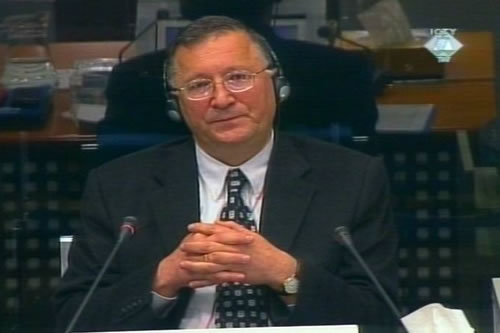Home
“HAMLET’S DILEMMA” OF PROFESSOR MARKOVIC
On the third day of his testimony at the trial of Slobodan Milosevic, Professor Ratko Markovic spoke about the dilemmas he had been faced with in March 1999 during the negotiations in Rambouillet and Paris and some ten years earlier, during the anti-bureaucratic revolution and the campaign to amend the Serbian Constitution. What has made Markovic “attractive” to the accused Milosevic, as the prosecutor contends?
 Ratko Markovic, defense witness for Milosevic
Ratko Markovic, defense witness for Milosevic As the head of the delegation of the Serbian government at the negotiations in Rambouillet and Paris in February and March 1999, Professor Ratko Markovic was faced with a “Hamlet's dilemma: occupation or bombardment”, as he described today. His choice was to refuse to sign the Rambouillet agreement on the political settlement for the Kosovo problem, which according to him, would be tantamount to an “occupation of the FRY.” Although NATO bombardment followed, Markovic still believes he did the right thing. True, he admits, “many lives were lost, but not our face.”
According to Markovic’s testimony today, the then president of the FRY Slobodan Milosevic was in no way involved in the resolution of the “Hamlet’s dilemma”. Markovic claims that the decision to reject the agreement was taken independently and unanimously by all members of the delegation, which was headed by him and the then president of Serbia, Milan Milutinovic, without “any instructions from Belgrade.”
Milosevic and his witness went through the list of names of the members of the delegation several times, in order to stress its multi-ethnic composition, i.e., the fact that all ethnic communities living in Kosovo were represented: Albanians, Serbs, Turks, Gorans, Muslims, Roma and Gypsies. At one point, Markovic described members of the delegation as “ordinary people”, but Milosevic did not agree with the description and the defense witness quickly “corrected” himself and said that those people “were not just picked up in the street”, but were “leading figures and political leaders in their ethnic communities.”
Markovic claims that “there were no negotiations” in Rambouillet, that the international mediators simply “gave them parts of the agreement one by one”, that they did not show them key military and security annexes before the last day, leaving them three and a half hours to give their views on them. He said that in effect it was a “dictate” behind which was the former US Secretary of State Madeleine Albright and not the Contact Group composed of six nations, including Russia, whose representative refused to accept the military and security annexes.
At the beginning of the cross-examination, prosecutor Nice quoted a text written by the witness at the time of the so-called anti-bureaucratic revolution and the campaign to amend the Serbian constitution, in which Markovic advocates that “all attributes of statehood be stripped” off the provinces and that any “direct links of the provinces and the federation” be discontinued.
In that document, Markovic wrote about yet another “Hamlet’s dilemma”: what would happen if the Serbian constitution cannot be amended in a constitutional manner and whether in that case the preference should go to “the respect of the Constitution or the survival of the state?” In the text Markovic resolved the dilemma in a way similar to the one in 1999. He wrote that “it should not be allowed that law triumphs at the expense of the collapse of the state.”
The prosecutor’s claim that such a “liberal view” of the rule of law had made Markovic “attractive to this accused,” and that in the intervening ten years Milosevic used him to “adapt the law as he saw fit”. Markovic indignantly rejected this claim by the prosecutor, accusing Nice of treating his “scientific opinion” like an “inquisitor”.
Linked Reports
- Case : Milosevic Slobodan - "Kosovo, Croatia and Bosnia"
- 2005-01-18 ILLEGAL SECESSION AND JOINT CRIMINAL ENTERPRISE
- 2005-01-13 JUDGES GET A LECTURE IN CONSTITUTIONAL LAW
- 2005-01-12 MILOSEVIC WILL NOT BE CALLING MLADIC AS HIS WITNESS
- 2005-01-20 PROSECUTOR CHALLENGES PROFESSOR MARKOVIC’S CREDIBILITY
- 2005-01-24 MAKING THE CONSTITUTION TO FIT SLOBODAN MILOSEVIC
- 2005-01-25 “NO ONE MUST BEAT” WHOM?
